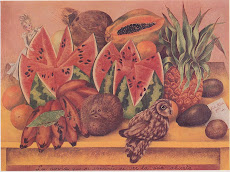hi everyone,
I too like the way this paper has come out both in terms of its form and its loose ends. I agree with Paul's suggestions for changes (points 2, 3 and 4).
The parts more specific to blogging and the creation of this paper could be summarized (not left as intact quotes), they could comprise another publication or they could be left somewhere online and you could reference that location.
As for cutting words, perhaps those with multiple posts or very long paragraphs could condense.
I agree that it would help to have a short introduction and conclusion that is more about the aspect of food.
I tried to rewrite my comments into the paragraph (below) that I hope speaks to the issue of corporeality and retains most of what was originally in the draft.
thanks Ian et al.!
Rachel
***
I think that desire to "decolonize the self" may be a starting point for some (many?) critical people engaging with questions of race in the US. It's...encouraged by anti-racist activism and one could argue that it's a liberal, individualistic response. But one could also say that efforts at reflexivity are a pathway toward, for instance, where Cook [2008] suggests Heldke [2003] ended up. For all the criticisms we might level at people trying to change their consumption practices individually or collectively, it's important to acknowledge the fraught, fuzzy and fragile nature of these positions and the embodied connections made through food. I've been trying to do that while admiring the work of those who have been very critical of the liberal, wealthy whiteness of alternative food and of various politics of consumption. I tend to agree with these critiques but find there's more to say. That was my starting point, at least, when I suggested that the viscous spatiality of alt food's whiteness is less cohesive, more desirous of non-racist connection, more interesting in its gendered female form or less relevant than we think (see Jean's comment). And in highlighting the importance of thinking about the corporeality of race and vegetables [2008], I was proposing (with others) that opening up the concept of race (beyond static formulations like 'eating the other' and beyond its mediation solely by the social) should be useful to anti-racism and our own analyses. Seen this way, race emerges materially through corporeal relationships to food--what people gravitate toward, what they touch and taste, what they grow. If race is an event, an open-ended becoming made by ongoing connection rather than only exclusion and erasure (Saldanha 2006), it suggests the need to look at what possible worlds open up through the connections that both divide groups and draw them together.
Slocum, R. 2008: Thinking race through feminist corporeal theory: divisions and intimacies in the Minneapolis Farmers' Market. Social and Cultural Geography 9(8):849-869
Saldanha, A. 2006. Re-ontologizing race: the machinic geography of phenotype. Environment and Planning D: Society and Space 24:9-24
Tuesday, September 8, 2009
Subscribe to:
Post Comments (Atom)

No comments:
Post a Comment